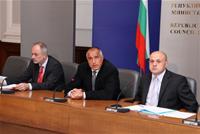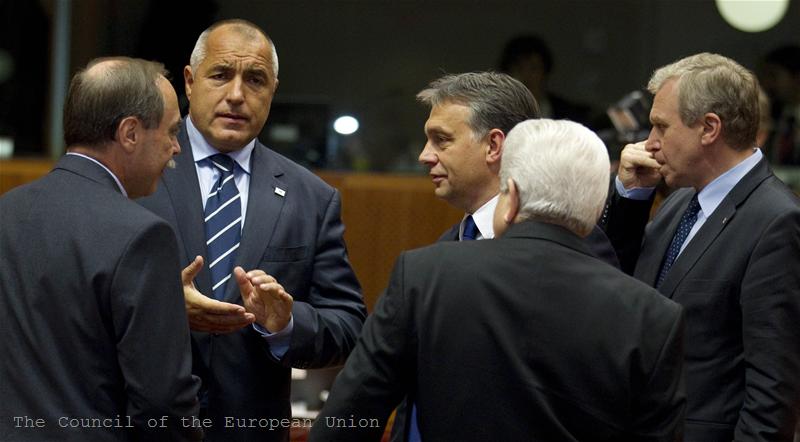High productivity - a stake for high pensions
Adelina Marini, August 23, 2010
 The government of Bulgaria has approved in the beginning of August amendments to the Social Insurance Code, by defining them as a pension reform. The amendments foresee, most of all, an increase of the required contribution period. euinside asked for the opinion of the economic analyst Gheorghi Stoev, managing associate at Industry Watch. He says that the amendments, again, postpone the solution of a problem, which will quite soon go out of control. He also thinks that the government is refusing to take responsibility for its actions. With Mr Stoev we also talked about a recent agreement with the World Bank for restructuring Bulgaria's loans as well as about the idea of the European Commission to introduce common European taxes.
The government of Bulgaria has approved in the beginning of August amendments to the Social Insurance Code, by defining them as a pension reform. The amendments foresee, most of all, an increase of the required contribution period. euinside asked for the opinion of the economic analyst Gheorghi Stoev, managing associate at Industry Watch. He says that the amendments, again, postpone the solution of a problem, which will quite soon go out of control. He also thinks that the government is refusing to take responsibility for its actions. With Mr Stoev we also talked about a recent agreement with the World Bank for restructuring Bulgaria's loans as well as about the idea of the European Commission to introduce common European taxes.
euinside: Can we call these amendments to the Social Insurance Code a pension reform?
GHEORGHI STOEV: No. These are amendments, aimed at mending a small part of the loopholes. More precisely - tackling the forthcoming demographic problem. After all, the problem is due to the fact that people have started to live longer and a pensioner gets the money of the taxpayers longer, which increases the need of financing pensions - something that was not foreseen 10 years ago when the first attempts for reform were made. The next government, if I could speak in terms of governments and not in years because it is clear that when the next minister would come or the next prime minister, there will be loopholes again, which will again have to be financed, again protests and we will again discuss the same thing; what would be different then, however, is that the problem will be more severe from a fiscal point of view. In other words the money that currently finance the so called social insurance deficit - coming from VAT as the largest source of revenues - at some point would not be sufficient and the government would have to take money from other spending areas.
This could be, say, education or healthcare. So, currently it seems we have some last reserves that help postpone the problem and, of course, everything goes hand in hand with the government's ambition to introduce some reform in the pension system. Naturally, such a reform is doomed to failure in its current form because it is not sufficiently radical and would not lead to a long-term solution, it would not lead to balancing the budget of the National Insurance Institute (NII) and, secondly, because there is a strong opposition, coming as if from within the cabinet. The people that must take this decision at an executive level, cannot agree to do it.
euinside: Here I see a kind of paradox because the Prime Minister creates the impression that in the end of the day he is the one to take the final decision. On what do you base your assumptions for internal disagreements?
GHEORGHI STOEV: I base it on the tradition, that has been established  recently, the decisions in the pension area to be purely expert, meaning that if a man can calculate and work with numbers, to have him sit and make some forecasts and tell you where you have a problem and how to solve it. But it cannot be like this. The decisions must be entirely political - someone has to decide how much to pay to how many people, what pensions and where to take the money from. These are not financial decisions, but entirely politically-social decisions and someone has to take a responsibility.
recently, the decisions in the pension area to be purely expert, meaning that if a man can calculate and work with numbers, to have him sit and make some forecasts and tell you where you have a problem and how to solve it. But it cannot be like this. The decisions must be entirely political - someone has to decide how much to pay to how many people, what pensions and where to take the money from. These are not financial decisions, but entirely politically-social decisions and someone has to take a responsibility.
So, the tradition the Prime Minister to appoint a financial expert to have him prepared an analysis and the Prime Minister then to say "see, I hired a big expert and he recommended me to do this and I accept it because the expert is really big". This, I think should be stopped because ultimately it means that you don't take any responsibility for what is going on. The truth is that you have responsibility before the voter - the one that has given you a mandate to finance his budget (those are pensioners, students, mothers, disabled people, gypsies, etc) and the other voters who have given you a mandate to gradually stop loot them (those of us who produce the income).
So, the politician must take a decision which voter he would serve and, if possible, to find a balance between the two interests. I would say it again, I don't think this should be a decision which should be taken under the pressure of the so called experts, trade unions, employers, trilateral councils.
euinside: It has been reported as a major success that the retirement age would not be raised, as well as the contributions. Do you consider this a success or is it part of what we have spoken about so far?
GHEORGHI STOEV: The fact that they are raising the required contribution period is a de facto an increase of retirement age. Ultimately the aim is to save current spending from the budget of the NII and this will be achieved the moment you postpone with a year the payments for people who would otherwise retire today. So, no matter it was said in the form of a contribution period of retirement age, the aim is clear - cutting spending. And spending will be cut, but the volume of these cuts will be a very small part of what we are talking about and what is the essence of the problem. Because we are talking about several billions of deficit. These billions will become more and more due to purely demographic reasons.
Maybe not in the term of this government but, let's say in 2016, these billions would be pretty enough to load Bulgaria exactly the way the external debt burden of the Greek government. It is very good to make such a parallel because it is clear that the difference between Bulgaria and Greece is that there [Greece] the debt is visible, meaning that someone has received bonds in order to lend money to Greece. In Bulgaria the debt is invisible, meaning that many consecutive Bulgarian governments had promised people to get a certain amount of money, without clarifying where the money would come from. Either way, we are talking about debt, fiscal pressure and potential incapability to meet these commitments.
euinside: When thinking about pension reform, do we have to make a thorough analysis and, most of all, a link with the economic policy of the government, because ultimately the pension system is being funded practically by labour market, is that right?
GHEORGHI STOEV: Exactly. There will not be a healthy pension system with happy pensioners unless there will be fast and strong economic growth. This must be clear to everyone. Even if you raise the contributions to 60% there will simply be no one to pay them, because there is no such kind of labour, no highly productive labour to finance the pensions. And the paradox is that the more productive labour becomes, the lesser the share of income you will need to finance a pensioner. In other words, the contributions would not be 32.3% of the income up to 2,000 levs (1,025 euro) but they could be reduced to 10% or 8 per cent.
The more IT specialists and people who deal with highly productive activity we have and the less constructions workers we have, the easier it would be for you to finance the people who live on pensions. And the lesser the burden on working Bulgarians would be. So, it is clear that economic growth and a fast growth of productivity are the key for a healthy and sustainable pensions model. But as we do not observe such a type of economic growth in Bulgaria, like in Singapore, Estonia, Turkey, China, we cannot afford an unrestrained pension policy.
On the contrary, in the current conditions the recession comes with signal lamps on to show us how dangerous it is to promise higher pensions and to allow people retire young. This is one of the positive things that have happened - the signals are very clear and eloquent, saying that if the pension model is not changed, Bulgaria could only hope to an economic miracle, to turn all of a sudden into some kind of an economic tiger that could transform the country from the poorest to rich at least like Slovakia, in order to start balancing public adjustments that a very big part of the population would live very well for many years to come.
euinside: Probably this is why the government would have to think about creating new jobs, instead of considering how to reduce unemployment. In other words, there is a trend of keeping the status quo - the existing jobs to be protected, without creating new jobs. Because we face another problem too - if more of the elderly people remain in the labour market, then the young people, just leaving universities, would have hard times to find jobs?
GHEORGHI STOEV: Yes, I hope that your questions does not contain a wish to create new state jobs?
euinside: No, not at all ...
GHEORGHI STOEV: ... to stimulate private sector to create new jobs. I agree but I would only add that if jobs continue to be mainly low-productive as what we call "basic positions", "average positions" (those where no specific knowledge is required or where an employer seeks specific things like age, communicative skills, good appearance), if those are 70% of all the jobs, we would need many long years to reach a standard of living close or comparable to countries like Slovenia or Austria.
In the end of the day this is the greatest challenge - with such a style of economic growth, which on paper is really high (for example before 2008 it was 6%) but when you look back and strike a balance you are still the poorest country in Europe but you still want to live with a European standard of pensions. This is impossible! There is just no chance this type of economy to finance such a standard of pensions as people enjoy in Germany or France. The only source of funding could come in the form of external debt. This means that the hidden debt of the pension insurance to become an open debt - someone then would have to say "we need some 10 bn euro to finance our debt towards nowadays pensioners" and the next government to borrow this money and issue bonds in return. This is a scenario which I am not sure anyone would want to apply. But no matter how we look on the situation, we arrive every time to the fiscal opportunities to finance spending.
 euinside: In this regard, recently the World Bank President Robert Zoellick came on a visit in Bulgaria, an agreement has been reached, aimed at restructuring Bulgaria's loans to the bank in a way that more bank experts to participate in writing projects, including for EU funds absorption. How would you comment on this, including the context of his visit, the restructuring of loans, the talking in principle about debt?
euinside: In this regard, recently the World Bank President Robert Zoellick came on a visit in Bulgaria, an agreement has been reached, aimed at restructuring Bulgaria's loans to the bank in a way that more bank experts to participate in writing projects, including for EU funds absorption. How would you comment on this, including the context of his visit, the restructuring of loans, the talking in principle about debt?
GHEORGHI STOEV: I am a little bit skeptical with regard to the function and the mission of the World bank. First of all, what they call fighting poverty and, secondly, their efficiency at a country level. Because, as you know, the World bank is active in many various continents, countries which have income between 5 and 50 dollars per day. Such a broad target of economies, I think, is a little hard to address with one and the same approach. Let me put things a little bit more directly, for the past I would not say 20 years, since Bulgaria became a member of the group, but since 1998 (the start of economic stability) - since then any attempts to import some good reason in areas like education and healthcare ended with failure.
My personal opinion is that the bank has not done anything reasonable, although an awful lot of money was poured here. These are the two specific areas which today are still in the same miserable situation, maybe except several very small steps in the right direction in the area of school education where the bank had experience with the Ministry of Education and introduced the vicarious budgets and before that - the single standard of financing pupils. Excluding these small successes, I would not say that the bank had a clear presence in Bulgaria's political life and in making reforms.
In contrast is the success of the IMF, with whose help the currency board has been introduced in Bulgaria. So, we have two external institutions, two supranational institutions - one is successful with almost no money at all. In other words - we have a lot of reforms against zero money and the World bank lent us nearly 4 bn dollars and there are almost no reforms at all. You can see for yourself the correlation efficiency vs. spending, and it is more negative for the World bank. I remain a pessimist, in spite of my respect for economists that work with the bank.
euinside: In this case, as far as I understand, they take under their control the absorption of their own money, especially those contracts, related to infrastructure, focusing on building administrative capacity that could be also used for EU funds absorption. Are you still that skeptical?
GHEORGHI STOEV: Yes, I think this is a desperate attempt the money to be directed more efficiently but history does not give me good grounds to be optimist. I even remember the words of a World bank man who was here on a mission, with a specific target. I will not name the area, nor the name of the man. But I remember that he told me: "Look, these are your problems and you have to solve them yourselves". In other words "we will give you pieces of advice, we will write thick books, reports, strategies and publish press releases, but nothing more".
Meaning, the pressure over the minister from a concrete head to become a reasonable reformer, he told me that this should come from people like us (economists and specialists). "Do not imagine that since we were paid for 2 weeks in Sheraton, this is motivating us a lot to turn your country into a developed one. We come here, write a report and go back". I would not say that all international institutions are like this. No - the EU is not like this, the IMF has its failures but successes as well. Fortunately, Bulgaria is among the successes. But I cannot claim that the World bank is one of those institutions that apply sufficiently effective pressure.
euinside: What impressed me while Robert Zoellick was here is that he talked in a very strange way about debt - 'here yo have a relatively decent budget deficit but in terms of debt you are well beyond the requirements of the Stability and Growth Pact, so don't bother to absorb the loans you've taken to construct infrastructure, because this would create jobs, would facilitate the business". In other words this is a hint for further indebtedness.
GHEORGHI STOEV: I think this should be interpreted differently in terms of political pressure, because such statements have mainly political characteristics and cannot be interpreted as a macroeconomic analysis. My personal view is that this is more a message, saying that if Bulgaria would start a more active policy towards membership to the eurozone, the World bank would support such efforts via its mechanisms and leverages. This is my interpretation of this statement and I think that it is directed more outside Bulgaria than towards the Bulgarians.
It is directed to the Europeans who are skeptical towards new potential members of the Monetary union. Just because he is the last person to make such an analysis - there are people who calculate some charts and make forecasts. But the truth is that this is a good message. Ultimately the political pressure for a stable fiscal policy in Bulgaria should go hand in hand with political pressure for support of Bulgaria's euro area membership, i.e. of countries who are friends, close to Bulgaria. This is a message to everyone to open up for membership of new countries that fit in the requirements.
euinside: The European Commission is considering to introduce a common European tax on financial transactions, carbon trade or airplane fuel, the revenues of which to go directly to the European budget because this would unburden Member States' annual contributions. How would you comment on such an idea?
GHEORGHI STOEV: In general I am an opponent of any taxes. I have always found myself awkward to defend my opposition against taxes. I think that whoever proposes taxes should defend the idea as a reasonable tool for such a type of economic policy. Whether a balance would be sought in the European budget, I think is disputable. I think there are many reserves, hidden in the expenses part in the budget, including agriculture encouragement, before looking for new financial sources. In other words, let them first see those bottomless holes, where money is being poured and then seek new income sources.
 | © The Council of the European Union
| © The Council of the European Union | © SofiaUtre/Bonchuk Andonov
| © SofiaUtre/Bonchuk Andonov | © EU
| © EU